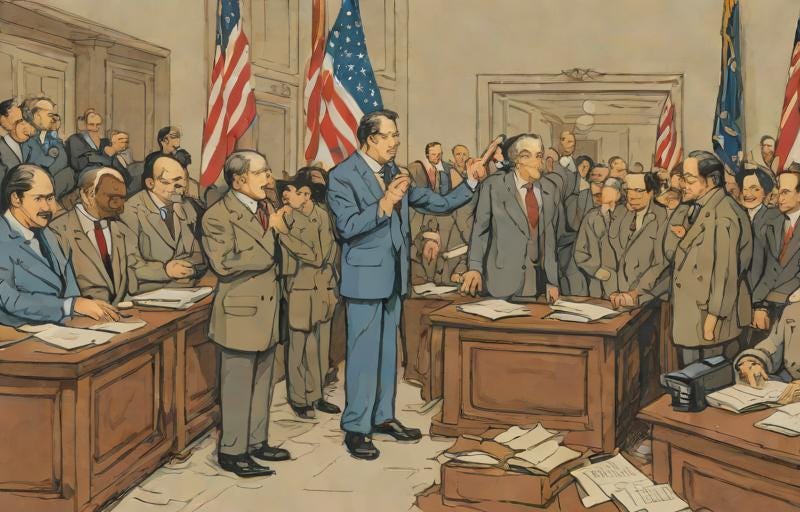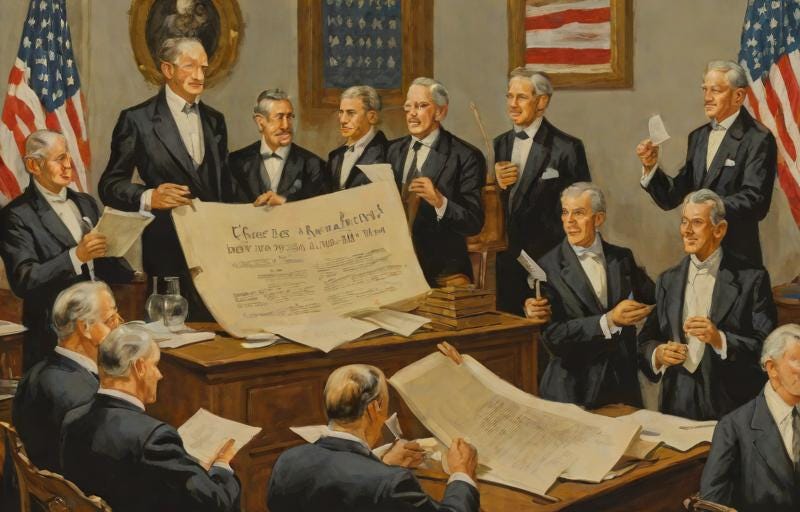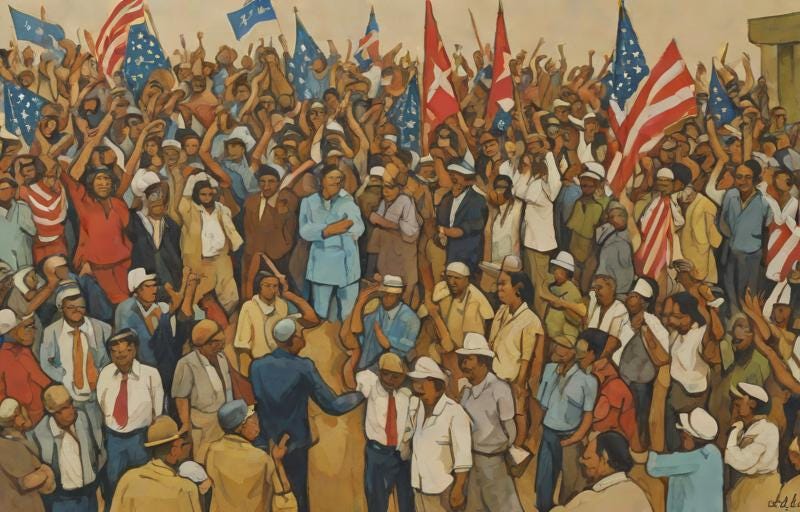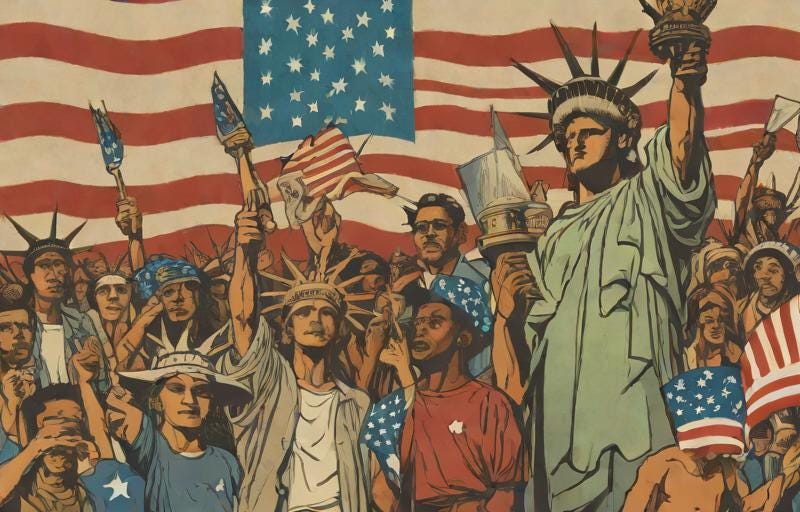The Damage To The American Identity
Unraveling the Shredded US Constitution. How can a government function, survive and then thrive while it arrogantly violates its own governing documents. A blatant slap on the face of every American.
The United States, often considered as the land of the free and a beacon of democracy, has a shadowy history marred by instances of aggression, intervention, and a blatant disregard for the very principles it claims to uphold. This article aims to critically examine the failures of the American identity, particularly in the context of the US government's actions that seem to shred the ideals embedded in the US Constitution.
Back to the future -
By delving into past and existing wars, genocides, and instances of human destruction instigated and or fueled by the US government, we can uncover the stark contradictions between proclaimed values and actual actions.
Wars as Instruments of Aggression:
The US government's involvement in various wars throughout history has often raised eyebrows, questioning the alignment of its actions with the principles enshrined in the Constitution. From the Vietnam War to the Iraq War, the United States has not hesitated to employ military force without clear constitutional justification. The Constitution grants Congress the power to declare war, yet the executive branch has frequently bypassed this requirement, raising concerns about the erosion of checks and balances.
Genocides and Human Destruction:
Instances of genocide and widespread human destruction linked to US government actions cannot be ignored. The Native American population endured forced relocation, violence, and dispossession, raising questions about the commitment to human rights and justice. Moreover, open interventions in countries like Afghanistan, Iraq, Syria, Libya, Yemen and Palestine have resulted in civilian casualties and destabilization, painting a grim picture of the US government's approach to global affairs.
Failures in Upholding Human Rights:
While the United States positions itself as a champion of human rights and democratic values, its actions have often contradicted these lofty ideals. The Guantanamo Bay detention camp, from where I reported in 2010, and witnessed how detainees are held without due process, or a serious trial, except for the ones in Gitmo airfield hangars, is a stark example of the erosion of fundamental rights in the pursuit of security. The use of torture in the post-9/11 era further tarnishes the image of a nation claiming to uphold the principles of justice and fairness.
Selective Enforcement of Democratic Values:
The US government's selective approach to promoting democracy abroad raises questions about the sincerity of its commitment to democratic values. Instances of supporting authoritarian regimes when aligned with strategic interests cast doubt on the consistency of US foreign policy. This raises concerns about whether the US is genuinely committed to fostering democratic governance or merely advancing its geopolitical objectives.
The Current Scenario -
The failure of the American identity is intricately linked to the US government's actions that often run counter to the principles enshrined in the US Constitution.
How can a government function and survive and thrive while it arrogantly violates its own governing documents. What a blatant slap on the face of every American citizen.
From wars waged without clear constitutional backing to instances of genocide, human destruction, and selective enforcement of democratic values, the chasm between rhetoric and reality is undeniable. It is imperative for American citizens to critically assess these actions and demand accountability to ensure that the American identity aligns with the values it professes to represent.
The Loss of the American Identity -
Erosion of Civil Liberties in the Name of Security:
One of the most alarming aspects of the failure of the American identity lies in the erosion of civil liberties in the name of national security. The post-9/11 era witnessed the implementation of surveillance programs like the Patriot Act, which granted unprecedented powers to intelligence agencies, allowing for mass surveillance of American citizens without proper oversight. This violation of privacy directly contradicts the Fourth Amendment of the Constitution, which protects against unreasonable searches and seizures.
Influence of Corporations on Government Policies:
The intertwining of corporate interests with government policies raises concerns about the erosion of the democratic process. Lobbying, campaign financing, and the revolving door reality, where individuals move between the private sector and government positions, have blurred the lines between public service and corporate influence. This dynamic challenges the foundational idea of a government acting on the interests of the people, as personal, industrial and corporate interests often take precedence.
Environmental Negligence:
The American identity is also tarnished by the government's historical negligence towards environmental issues. From the exploitation of natural resources to lax regulations on industries contributing to air and land pollution, the US government has prioritized economic interests over environmental sustainability. This disregard for the long-term well-being of our surrounding contradicts the responsibility to provide a secure and healthy environment for current and future generations, as implied in the Preamble of the Constitution.
Systemic Racism and Social Injustice:
The persistent issue of systemic racism and social injustice further highlights the failure of the American identity. Despite constitutional guarantees of equal protection under the law, marginalized communities continue to face discrimination in various forms. The criminal justice system, education, and economic opportunities are just a few arenas where disparities persist, challenging the notion of a truly inclusive and equitable society.
The failure of the American identity extends beyond the realms of foreign policy and military actions. It encompasses the erosion of civil liberties, corporate influence on governance, environmental negligence, and systemic injustices.
Hypocrisy - “The practice of claiming to have moral standards or beliefs to which one's own behavior does not conform; pretense.”
Acknowledging these failures is not an indictment of the entire nation but a call for introspection and a commitment to rectify the deviations from the principles embedded in the US Constitution. Only through genuine efforts to address these issues can the United States hope to reconcile its proclaimed identity with the realities that have, at times, shredded the very fabric of its constitutional ideals.
Immigration Policies and Humanitarian Concerns:
The failure of the American identity is also evident in the realm of immigration policies and the treatment of asylum seekers. Despite being a nation built by immigrants, the US has grappled with issues of xenophobia and restrictive immigration measures. The chaos at the southern border, lazy governance, the detentions, inadequate conditions, and the lack of a comprehensive immigration reform underscore the divergence between the nation's values and its actions.
The Constitution guarantees equal protection and due process to all persons, yet the treatment of immigrants often falls short of these principles. Eiter immigrants are used for one reason or the other or the immigrants abuse the system because of the lack of law enforcement. This inconsistency shows the absence of a clear immigration policy and raises questions about the inclusivity and compassion that has been integral to the American identity.
Economic Disparities and Income Inequality:
The widening gap between the rich and the poor in the United States challenges the narrative of equal opportunity and social mobility. Economic policies favoring the wealthy, tax loopholes benefiting corporations, and the lack of comprehensive social safety nets contribute to a society where economic disparities persist. This economic inequality contradicts the constitutional promise to promote the general welfare and ensure domestic tranquility.
Examples of corporate bailouts during economic crises, while ordinary citizens face financial hardships, further highlight a system that prioritizes the interests of the elite over the well-being of the broader population. Addressing economic disparities is crucial for aligning the American identity with the ideals of fairness and equal opportunity.
Educational System Failures:
The American identity is intricately linked with the notion of an informed and educated citizenry. However, shortcomings in the educational system, marked by disparities in resources, unequal access to quality education, and an emphasis on standardized testing, challenge the realization of this ideal. The failure to provide a universally robust education system contradicts the constitutional commitment to promote the general welfare.
Additionally, the rising cost of higher education and the burden of student loan debt hinder social mobility and exacerbate existing inequalities. A reevaluation of educational policies is essential to uphold the principles of a well-informed and empowered citizenry.
Polarization and Erosion of Democratic Values:
The increasing polarization within American society and the erosion of democratic values pose significant threats to the nation's identity. The inability to engage in constructive dialogue, the spread of misinformation, and the erosion of trust in institutions challenge the very foundations of the American experiment.
Instances of voter suppression, voter fraud, election rigging, gerrymandering, and attempts to undermine an already indermiend electoral process raise concerns about the fidelity to democratic principles. The Constitution establishes the framework for a government of the people, by the people, and for the people. However, when these principles are compromised, the American identity is diminished then damaged and then vanished. How Many of the pharaohs or the Greeks do you see walking today?
The failure of the American identity is a complex interplay of domestic and foreign policy actions, systemic injustices, economic disparities, and challenges to democratic values. Addressing these issues requires a collective effort by all Americans to reconcile their nation's professed ideals with its historical and contemporary actions. It is an ongoing process that necessitates accountability, introspection, and a commitment to upholding the principles enshrined in their own Constitution. Only through genuine efforts to bridge these gaps can the United States hope to redefine a more authentic and inclusive American identity.
Where, in all of the above, is the lack of adherence and enforcement of the US constitution?
If you’ve read this far then you know the lack of adherence to their own constitution is evident across various dimensions discussed in the article. Here's a breakdown to refresh your memory of how each section points to constitutional shortcomings:
Unconstitutional Wars:
The Constitution grants Congress the power to declare war (Article I, Section 8), yet the United States has engaged in military conflicts without explicit congressional declarations. This undermines the constitutional balance of powers, concentrating war-making authority in the executive branch.
Erosion of Civil Liberties:
The Fourth Amendment protects against unreasonable searches and seizures, yet mass surveillance programs like the Patriot Act infringe upon citizens' privacy without proper oversight. This violates the constitutional guarantee of protection against unwarranted government intrusion.
Corporate Influence on Policies:
The Constitution emphasizes representation for the people, but the undue influence of corporations in policymaking challenges this principle. Lobbying and campaign financing practices raise concerns about whether policies truly reflect the will of the people or serve the interests of powerful but dead entities.
Environmental Negligence:
While not explicitly outlined in the Constitution, the Preamble refers to promoting the general welfare and securing the blessings of liberty to posterity. Environmental negligence, including lax regulations contributing to pollution and and damaging our surroundings, either through warfare or corruption, neglects the responsibility to safeguard the well-being of current and future generations.
Systemic Racism and Social Injustice:
The Constitution guarantees equal protection under the law (14th Amendment), yet systemic racism persists. Disparities in the criminal justice system, education, and economic opportunities suggest a failure to ensure equal rights and opportunities for all citizens.
Immigration Policies:
Due process and equal protection are constitutional principles (5th and 14th Amendments), but harsh immigration policies, family separations, easy access for repeat offenders, gangs and criminals to re-enter, and inadequate treatment of asylum seekers raise concerns about adherence to these constitutional guarantees.
Economic Disparities:
The Constitution's commitment to promoting general welfare is contradicted by economic policies favoring the wealthy. Income inequality challenges the pursuit of economic justice and creates a negative-equity, debt for most of the citizens.
Educational System Failures:
The Constitution doesn't explicitly address education, but the commitment to promoting the general welfare implies a responsibility to provide quality education. Disparities in educational resources and access suggest a failure to ensure equal educational opportunities.
Polarization and Erosion of Democratic Values:
The US Constitution establishes a government deriving its power from the consent of the governed. However, polarization, partisanship, nepotism, revenge, greed, misinformation, and the undermining of the truth and the merit process erode the democratic values essential to the functioning of a so called constitutional republic.
In essence, the lack of adherence to the U.S. Constitution is apparent in actions that deviate from its principles, whether through unconstitutional wars, erosion of civil liberties, corporate influence, environmental negligence, systemic injustices, immigration policies, economic disparities, educational failures, or challenges to democratic values.
For the United States and for Americans, no matter what side they’re on, the US Constitution is the foundational document that this country is governed by, what glues it all together for America, but deviations from its principles undermine the very essence of the American identity and even the existence of an America.
Remedies to fix this nationally and then internationally
Addressing the systemic issues that have led to the failure of the American identity requires comprehensive reforms both nationally and internationally. Here are potential remedies to restore the alignment of actions with constitutional principles:
National Remedies:
Constitutional Reaffirmation:
Engage in a national dialogue to reaffirm and strengthen commitment to your own constitutional principles. This involves public education campaigns, civic engagement initiatives, and fostering a sense of civic responsibility to bring reforms in all government departments across the board.
Legislative Reforms:
Advocate for legislative reforms that reinforce constitutional checks and balances. This may include measures to ensure congressional approval for significant military engagements, campaign finance reform to limit corporate influence, and revisions to surveillance laws to protect civil liberties.
Judicial Oversight Enhancement:
Strengthen judicial oversight to ensure the judiciary acts as a robust check on unconstitutional actions. This involves appointing judges committed to upholding constitutional principles and encouraging legal challenges to unconstitutional policies. Otherwise what is the use of this document? Use something better then.
Educational Restructuring:
Reform the educational system to ensure equal access to quality education for all citizens instead of burdening the kids to pay debts for the next half of their lives. This includes addressing disparities in resources, revisiting standardized testing practices, and promoting a curriculum that fosters critical thinking and civic engagement.
Environmental Policies:
Implement and strengthen environmental policies that align with the constitutional mandate to promote the general welfare. This involves smart regulations, investments in sustainable technologies, and a commitment to intelligently utilizing and maximizing natural resources for the good of the people.
Addressing Systemic Racism:
Enact policies to address systemic racism and promote social justice. This includes major criminal justice reforms on epic proportions, equitable economic policies, and initiatives to eliminate disparities in food, housing, education and healthcare.
Immigration Reform:
Pursue comprehensive immigration reform that respects due process, protects human rights, and upholds the constitutional principles of equal protection. This may involve a path to citizenship, clear policies on deportation or re-entry and reforms to detention practices.
Economic Equity Initiatives:
Implement policies aimed at reducing income inequality, reforming taxation, social safety nets, and measures to ensure fair labor practices. This aligns with the constitutional commitment to promote the general welfare.
International Remedies:
Diplomacy Over Militarism:
Prioritize diplomacy and international cooperation over military interventions. Engage in multilateral efforts to address global issues, respecting the sovereignty of other nations and strictly adhering to international law.
Human Rights Advocacy:
Lead by example in promoting human rights locally and then globally. This involves addressing human rights violations within the U.S. and actively advocating for human rights and democratic values in international forums.
Environmental Leadership:
Take a leadership role in global environmental efforts. Stop bombing other nations and spilling their blood while destroying land and progeny, participate in international agreements aimed at protecting our air and the environment.
Global Economic Fairness:
Advocate for fair global economic policies that prioritize equitable development. This includes supporting international trade agreements that consider the well-being of all nations and address economic exploitation.
Refugee and Asylum Policies:
Revise immigration policies to align with international humanitarian standards that you helped set up in the first place. Ensure fair treatment of refugees and asylum seekers, collaborating with other countries to address the root causes of displacement.
Peacebuilding and Conflict Resolution:
Invest in diplomatic solutions to conflicts and support international peacebuilding efforts. This includes promoting dialogue, conflict resolution mechanisms, and addressing the underlying causes of global tensions.
Global Health Collaboration:
Collaborate internationally on public health initiatives, that benefit people not corporations. This involves supporting naturally grown food and access to clean drinking water for everyone so you can seriously address health disparities on a global scale.
Fair Governance:
Promote fair governance and human rights locally and globally without double standards. Support initiatives that strengthen independent institutions, foster civil society, help your fellowmen and empower citizens in other nations.
Implementing these remedies requires individual and political will, public support, and a commitment to upholding values and principles both domestically and internationally that are written in your own constitution. It necessitates a shift in policy priorities, a dedication to justice and equity, and a recognition of the interconnectedness of people and the global challenges that come with them. By enacting these reforms, the United States can work towards a more genuine embodiment of its own constitutional ideals on the national and international stages.












